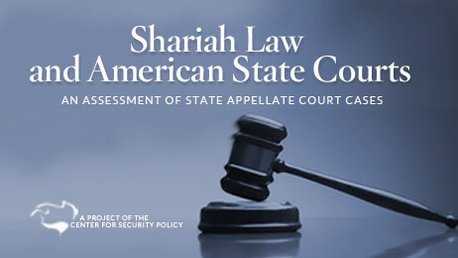Shariah Law and American State Courts: An Assessment of State Appellate Court Cases
This study evaluates published appellate legal cases that involved “conflict of law” issues between Shariah (Islamic law) and American state law.

AMJA: From “About Political Plurality in Islamic country”
by Dr.Salah Al-Sawy22
Ninth: As for the extent of legality of political plurality before establishing the Islamic State, we see it is permissible to have plurality that is capable of co-ordination, completeness, common work and co-operation with others to set up Islam, and at the same time, we see it is impermissible to have plurality that rejects co-operation, the closed plurality that is built upon ideologies and concepts, because they are a hindrance to the way of enabling for fixation….
Tenth: There is no problem in making alliances with moderate secular trends in the stage of pursuance of establishing the Islamic State, on condition that the subject of alliance is legal, and that it must not comprise any bindings that would harm the message of the religion, or that would tie the hands of the people who are involved in the Da‘wa works and prevent them from spreading the truth and from marching towards the objective of establishing the Islamic State…
As for making alliances with the secular trends for eliminating the prevailing falsehoods, and then taking the matter afterwards to the test of the will of the majority, we see it is permissible to have what we mostly think it comprises the ability of power to establishing the Islamic State, or at least, reducing the degree of prevailing oppression and paving the convenient way for the Da‘wa activities to prosper and flourish, and we prevent alliances in which we mostly think would not achieve any of these objectives for the Islamic State….
AMJA: A recent fatwa from AMJA on democracy23
But democracy gives free reign to the authority of the Ummah, and puts no ceiling on it. The law is the expression of its will, and if the law says it, the conscience must be silent! A constitutionalist even said: “We have departed from the divine right to rule for kings, and replaced it with the divine right to rule for parliaments!” The shari’a, on the other hand, differentiates between the source of the legal system and the source of the political authority. The source of the legal system is the shari’a, while the source of the political authority is the Ummah. Meanwhile democracy makes the Ummah the source of both.
AMJA: Judiciary work outside the land of Islam24
AMJA members discussed the permissibility of resorting to the judiciary system outside of the land of Islam. In this connection, AMJA asserts that in principle, it is incumbent upon all Muslims to resort to Islamic law for arbitration inside and outside the land of Islam. Indeed, resorting to Islamic law for arbitration whenever it is within one’s ability to do so is what distinguishes a believer from a hypocrite.
However, it is permissible to resort to a man-made judiciary system in a land that is not ruled by Islamic law if it becomes the only way for someone to retrieve one’s legitimate right or alleviate a grievance- provided one does not exceed what rightfully belongs to him under the Islamic law. Therefore, one should consult with the scholars first to know precisely what is due for him in that specific dispute under Islamic law.
Furthermore, since attorneys are representative of their clients, it is permissible to practice law within the scope of permissible, just, and legitimate cases that are filed to demand a right or alleviate a grievance. Similarly, it is permissible to study, teach, and understand man-made laws for the purpose of realizing the superiority of the Islamic laws, or practicing law in an environment that does not recognize the sovereignty of the Islamic law, intending to defend the oppressed people and retrieve their rights. This is, however, contingent upon the possession of enough Islamic knowledge, in order to avoid becoming an unwitting participant in sinful actions and transgressions.
AMJA members agreed that, in principle, it is prohibited for someone to assume a judiciary position under an authority that does not rule by Islamic law unless it becomes the only way to alleviate a great harm that is threatening the main body of Muslims. This is, again, conditional upon possessing knowledge about Islamic law, knowing rules and regulations of the Islamic judiciary system in Islam, and choosing a branch of practice as close in specialty as possible to the rules and regulations of Islamic law. In addition, one should judge between people according to Islamic law as much as one can. Furthermore, while in this position, one should maintain displeasure in his heart to the man-made laws. Needless to say, this ruling is an exception that is governed by the aforementioned provisions and restricted to necessity only.
22https://www.amjaonline.com/en_d_details.php?id=21
23https://translating-jihad.blogspot.com/2011/03/american-muslim-leader-issues-fatwa.html
24The Assembly of Muslim Jurists in America in cooperation with The Islamic League of Denmark: The Second Annual Session: Copenhagen, Denmark: 22-25 June, 2004, https://www.amjaonline.com/en_d_details.php?id=94
- LIVE NOW – Weaponization of US Government Symposium - April 9, 2024
- CSP author of “Big Intel” is American Thought Leaders guest on Epoch TV - February 23, 2024
- Four weeks after release, Big Intel remains a #1 Amazon bestseller - February 13, 2024
